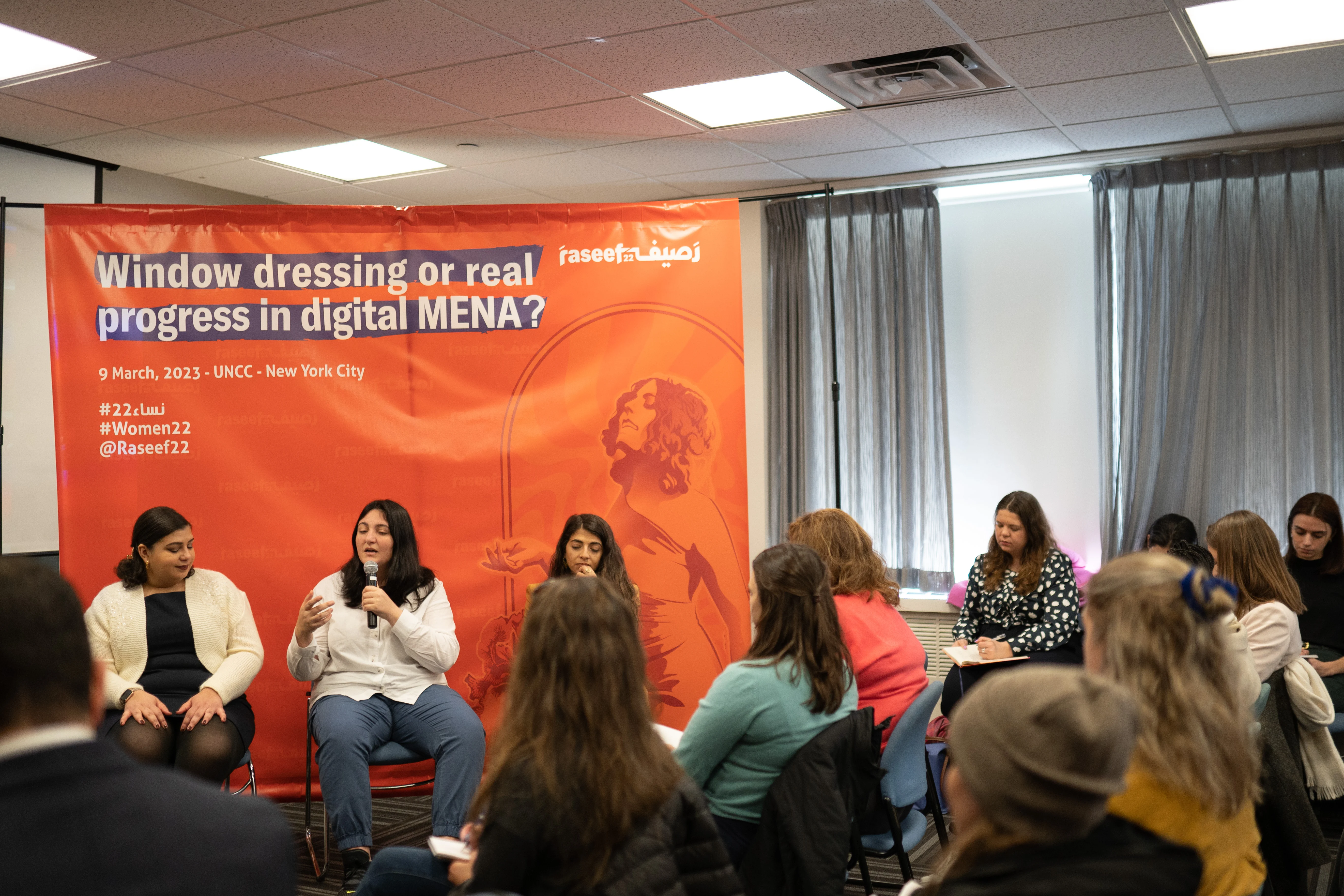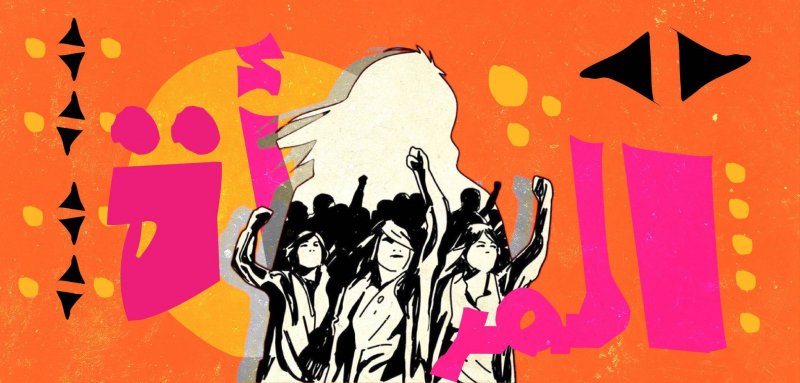Last month in Lebanon, Hassan Musa Zuaiter killed his wife Zainab Zuaiter, and then her brother appeared in a recorded video with his relatives justifying the crime under the label of "honor." It was a horrific crime, not the first in Lebanon, as the KAFA organization documented 18 cases of spousal violence that ended in murder last year.
It's a painful scene that we don't really know how to react to, nor how our reactions should be as impunity and violations against women continue to pile up. This crime coincided with my return from New York, after Raseef22 participated in the 67th session of the Commission on the Status of Women. My friend asked me, "What are you really achieving in these sessions?"
At a time when an improvement in the reality of women in our country appears to be almost non-existent, there is still a glimmer of hope
No matter how difficult it is to convey what we really talked about, and although the question was also painful to hear, it is certainly a logical one, in a context where the scope of work of women's rights defenders in our region is expanding and deepening... and it is a question we ask ourselves from time to time whenever we are overwhelmed with a sense of disappointment, pain, shock and trauma.
As difficult as it is to answer such questions, even in the face of those who were not originally interested in changing the reality of women for the better, the pain lies in thinking about them as well. While there seems to be almost no improvement in the reality of women in our country, there is still a glimmer of hope that raises another question: How do we explain the strength of sharing feminist experiences and their importance within safe spaces on the one hand, while society refuses to acknowledge these violations on the other?
On the 8th of March, 2023, a team from Raseef22 participated in the 67th session of the Commission on the Status of Women in the United States, by hosting a session to discuss effective opportunities for women's social and political representation, and to reflect on the role of digital solutions in the MENA region. We also participated in a reality check session on accelerating gender justice and sexual and reproductive health through digital technologies.
On March 8, Raseef22 participated in the 67th session of the Commission on the Status of Women in New York, hosting a session to discuss effective opportunities for women's social and political representation and the role of digital solutions in MENA region
Personal experiences... Are they really personal?
In these spaces, we talked about our personal and individual experiences, and of course, most of us found – when talking about Arab countries and in the presence of representatives from different countries around the world – that many experiences are similar and intersecting, even if the legal or social contexts differ.
At a very young age, I used to write about social stigma and criticize it, and I was also fighting for my own independence without understanding that I was doing some kind of feminist activism, because of course I didn't fully understand the word at the time.
Today, after the desire to understand and reclaim my rights as a woman led me to work in the human rights field, I came to understand and speak about the fact that women in Lebanon still live without the ability to grant citizenship to their children, how women are subjected to violence, rape and harassment without any kind of accountability at the practical and legal levels, and that there are 15 personal status laws in Lebanon, under which women are deprived of their inheritance, divorce and custody rights according to sect. And of course, I spoke of how women are the most marginalized and live within societies and communities that justify violence in the name of honor or religion through hate speech and societal violence, and cannot even reach political or social representation.
Over time, I have learned, through the spaces of struggle, especially the digital ones, that our individual stories and difficulties are not really individual
Digital spaces: A mirror of a patriarchal society or a safe space?
I learned over time, and through the spaces of struggle, especially the digital ones, that our individual stories and difficulties are not really individual. Therefore, that little girl who began writing since childhood and witnessed direct and indirect violence, is very similar to Zainab, and many other women who are killed today, and then become afraid of confrontation because if they are not actually killed physically, society will kill them through cyberbullying, social stigma, and vilifying them in the name of honor or religion.
Returning to the 67th session, and since this year's sessions were directly related to digital practices, we, along with representatives from partners such as Oxfam, Fe-male, UNICEF, and UNFPA, discussed the role of civil society organizations and the media in changing the traditional stereotypical narratives that traditional media institutions have accustomed us to. Therefore, harassment of women in the Arab world is increasing, and feminist activists are being pushed out of digital spaces, as if these spaces are a mirror of society, making it almost impossible to talk about violations. A number of women and feminists from around the world shared similar experiences in the discussions, even in countries that claim to be pioneers in protecting women's rights.

At the same time, these same digital exclusionary spaces may serve as safe spaces, as many women share their experiences as well as their success stories, especially through independent media organizations, which have a responsibility to cover individual stories and link them to societal issues. Who really hears us? How can the media inform the public about the reality of women in our Arab world, where it is difficult to talk about all forms of social stigma or to actually be convinced that violations of women's rights are increasing even when evidence is presented and shared through these platforms?
These same digital exclusionary spaces serve as safe spaces, as many women share their experiences and success stories, especially via independent media organizations that have a responsibility to cover individual stories and link them to societal issues
Where is feminism today? And what have we learned from this experience?
Many women – Arabs, Ukrainians, Africans, Americans and others – have shared the same fears and concerns, refusing to sideline feminist issues, despite daily attempts by society to shelve legal and practical amendments that protect women, as they wait for global collapses to end... while women are being killed, marginalized and silenced, as they seek support, media and institutions that speak and understand their language.
Herein lies the importance of the media's role in highlighting women's successes and struggles, especially at the political level, in addition to using and adopting new terminology that gives victims their due rights. Where is the legitimacy of the word "honor" when we talk about the killing of a woman?
Here, too, lies the strength in uniting efforts, exchanging feminist experiences, and finding alternative solutions within the digital space to work around digital and societal barriers and censorship, just as feminist movements have done throughout the ages on the ground.
Our presence, as Raseef22, in these sessions is essential, in terms of amplifying women's voice in the Arab region, in all its ethnic and religious diversity, and benefiting from sources of strength – as an important and essential part of what we achieve
Hence, our presence, as Raseef22, in these sessions is essential, in terms of conveying and amplifying the voice of women in the Arab region, in all its ethnic and religious diversity, and benefiting from the sources of strength. This is part of what we achieve, and it is an important and fundamental part. Therefore, our participation in sharing women's individual stories on independent platforms without any restrictions is in itself an initiative to join the efforts of millions of women around the world.
On a personal level, participating in such sessions, presenting painful stories and experiences, which in part encourages strength, is what gives me the strength to continue, even if I return to a country where women are still being killed and perpetrators escape punishment... The strength to continue in order to convey the bitter reality and change it to make it become just and fair for women.
* The views and opinions expressed in this article are those of the author’s and do not necessarily reflect the official policy or position of Raseef22
Raseef22 is a not for profit entity. Our focus is on quality journalism. Every contribution to the NasRaseef membership goes directly towards journalism production. We stand independent, not accepting corporate sponsorships, sponsored content or political funding.
Support our mission to keep Raseef22 available to all readers by clicking here!
Interested in writing with us? Check our pitch process here!





